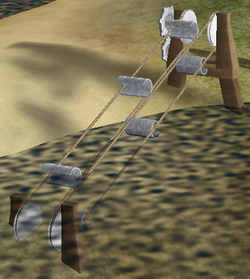The Wiki for Tale 8 is in read-only mode and is available for archival and reference purposes only. Please visit the current Tale 11 Wiki in the meantime.
If you have any issues with this Wiki, please post in #wiki-editing on Discord or contact Brad in-game.
Water Mine
| English | français |
| Water Mine | ||||||||||
|---|---|---|---|---|---|---|---|---|---|---|
 |
||||||||||
| (Building) | ||||||||||
| Location | ||||||||||
| Outside | ||||||||||
| Requirements | ||||||||||
|
||||||||||
A Water Mine is a large contraption (previously corkscrew-shaped, now a series of buckets on a belt) designed to siphon Gems and Cuttable Gems from the water. Made primarily of glass, it is built near water and is wound by hand.
Sources
This building becomes available after you have learned the Water Mining tech.
Cost
- 24 Glass Pipes
- 1 Iron Large Gear
- 4 Copper Straps
- 12 Pulleys
Details
Placement
A Water Mine can still be built if it is too close to an existing Water Mine, but only the one most recently wound will produce gems. Listening to the pipe of the nonfunctional one returns the message "Aside from the unwinding of the spring in the collar, you hear nothing." If there is a mine within interference range you'll get a warning when trying to build. It is suggested that mines should normally be placed no closer than about 21 coordinates.
Beware! This building doesn't have a build window, it will be built as soon as you click water mine, unless another water mine is in interference range.
Running a Water Mine
Once a Water Mine is started, it will run on its own for 2 teppy-hours. During the first 5 teppy-minutes, no gems will be produced, but afterwards, it may randomly dispense gems extracted from the sediment. These appear in the hopper to be picked up. The appearance of a gem is signaled by a loud "gurgling" or "bubbling" sound effect heard by those within 64 coordinates (which is the same as the visual range. i.e. if you can see it, you can hear it). A gem will only stay in the hopper for 1 teppy-minute, after which it disappears.
The type of gem dispensed by a Water Mine is random. Usually it is one of the types of cuttable gems, but ordinary gems can also appear. These can be of any size, just like those produced by regular mines. (Yes, this CAN include Huge, but it's not at all common.)
If you have not gotten any gems after 30 minutes things you can try are:
- Be sure you have building sounds turned on by clicking on yourself-Options-Audio. Max it if you have any doubts. (Check your computer sound too to be sure it is on.)
- Change the pitch of it. Some pitches give little results. Individual mines vary, try it for a couple hours (well at least half an hour) and if you don't like what you're getting, change it.
- Be sure there are no other mines running within 21 coordinates. (Listen to the pipe.)
Pitch Angle
Not much has been recorded here about Pitch Angle and how it affects gem acquisition. Ancestral lore states that the optimum pitch angle is different for each Water Mine, and each must be individually calibrated through trial and error.
- Pitch may affect what types of gems a water mine gives you.
- If you aren't getting anything out of the mine after 30 minutes, try changing the pitch.
Watermine Output Tracking Template
| Pitch | Min Before First Gem |
Cuttable Amethyst | Cuttable Citrine | Cuttable Garnet | Cuttable Jade | Cuttable Lapis | Cuttable Sunstone | Cuttable Turquoise | Quartz | Ruby | Topaz | Emerald | Sapphire | Diamond | Opal |
|---|---|---|---|---|---|---|---|---|---|---|---|---|---|---|---|
| 0 | 0 | 0 | 0 | 0 | 0 | 0 | 0 | 0 | 0 | 0 | 0 | 0 | 0 | 0 | 0 |
Byproducts
Depending on your Arthropodology skill level, collecting Gems and Cuttable Gems from a Water Mine can produce Oyster Mites, Glass Worms, Footworms, Bloodworms, Nippleworms, Bristleworms, and Needleworms.
